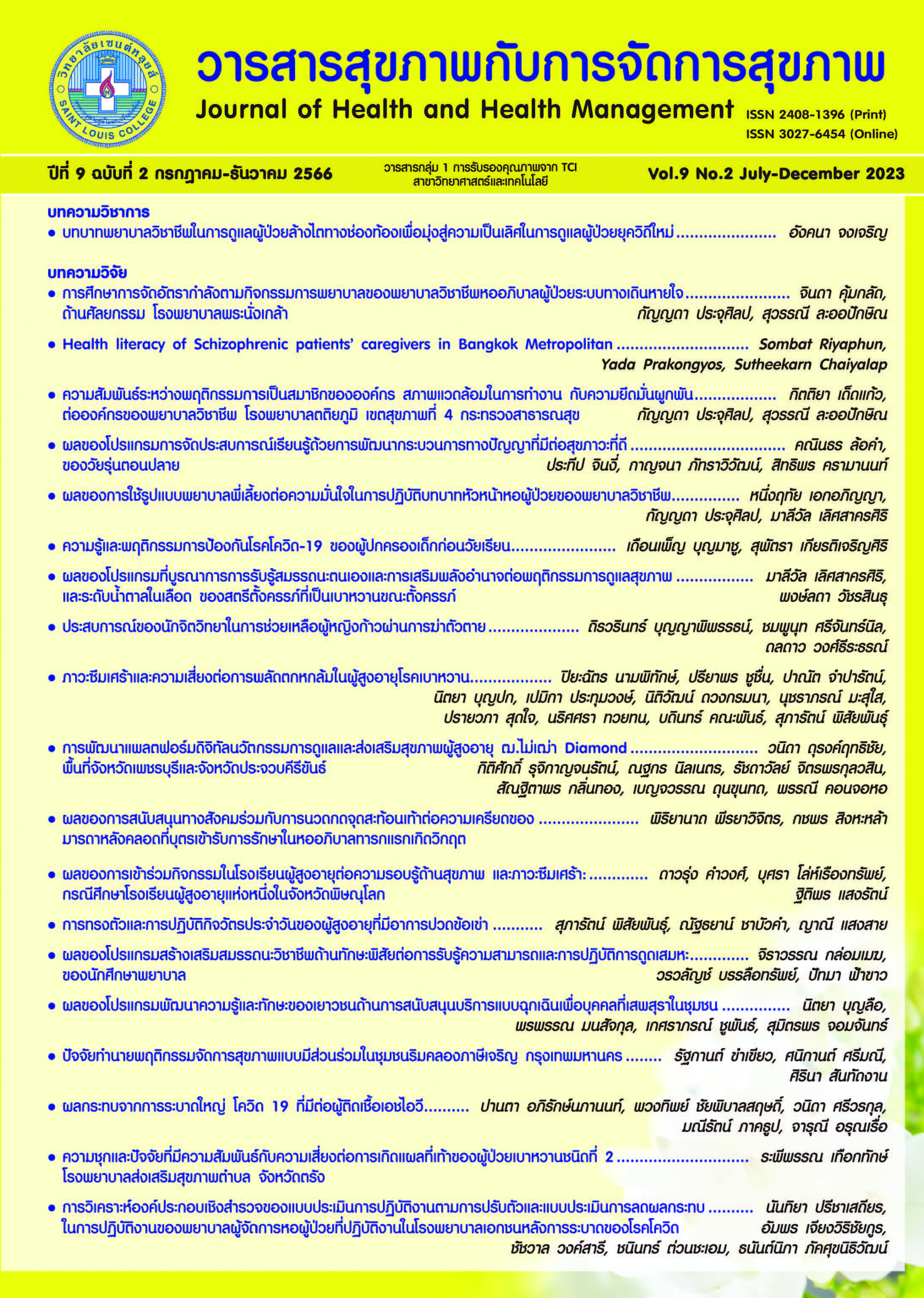Effect of Learning Experience Provision Program Through Cognitive Process Development on Well-being of Late adolescents
Keywords:
Cognitive Behavior Approach, Resilience, Positive Youth Development, Well-beingAbstract
This study aimed to investigate the effects of a learning experience provision program, through cognitive process development, on the well-being of late adolescents. The research design was a quasi-experimental pretest-posttest control group design. The sample consisted of students from private universities in Bangkok who were qualification according to criteria and voluntarily took part until the end of the study. The 51 participants were randomly assigned to either the experimental group (24 subjects) or the control group (27 subjects). The instruments used included well-being measurements consisting of 55 items, which were both validity (more than .66) and reliability (between .927 to .948). The learning experience provision program through cognitive process development was based on the cognitive-behavioral approach and integrated with other techniques, namely prime-to-behavior, the interaction between humans in the theory of the ecology of human development, and observational learning in terms of social cognitive theory. The program aimed to increase well-being by developing Resilience and PYD. There were both qualification program by experts and tryout. After applied to the sample, the results found that the posttest well-being level of the experimental group (= 4.16) was statistically significantly higher than the pretest (
= 3.48) at a level of .001. The posttest well-being of the experimental group (Adj. Mean = 4.26) was also found to be significantly different from the control group (Adj. Mean = 3.96) at a level of .05 (F = 5.49) when analyzed by ANCOVA, which was controlled by the covariate by the pretest score of well-being. Consequently, it can be inferred that the developed program has practical applications to aid students with minor issues who are awaiting preliminary assistance from specialized psychologists. This leads to a more efficient provision of help.
References
ฐินีรัตน์ ถาวร, สาธกา พิมพ์รุณ, และวารีรัตน์ ถาน้อย. (2561). ปัจจัยที่สัมพันธ์กับสุขภาวะทางจิตใจของนักเรียนมัธยมศึกษาตอนปลาย. วารสารพยาบาลศาสตร์, 36(3), 59-70.
ทัชชา สุริโย. (2559). ผลของโปรแกรมการให้คำปรึกษากลุ่มที่มีต่อการเสริมสร้างความฉลาดทางสังคมในวัยรุ่นกลุ่มเสี่ยงต่อภาวะซึมเศร้า (ปริญญานิพนธ์ ศศ.ม.). มหาวิทยาลัยศรีนครินทรวิโรฒ, กรุงเทพฯ.
ประณต เค้าฉิม, (2549). เอกสารประกอบการเรียนการสอน วิชา จิตวิทยาวัยรุ่น. กรุงเทพฯ: มหาวิทยาลัยศรีนครินทรวิโรฒ.
ปิยนุช ชมภูกาศ. (2560). ผลของโปรแกรมการให้คำปรึกษาแบบกลุ่มตามแนวปัญญาพฤติกรรมนิยมร่วมกับการพัฒนาสติต่อความกรุณาต่อตนเองในวัยรุ่นที่มีภาวะซึมเศร้า (ปริญญานิพนธ์ ศศ.ม.). มหาวิทยาลัยศรีนครินทรวิโรฒ, กรุงเทพฯ.
ริญญารัตน์ วรจินตนาลักษณ์, พระครูภัทรธรรมคุณ, และ พีรวัฒน์ ชัยสุข. (2563). การศึกษาสุขภาวะยุคไทยแลนด์ 4.0 ตามหลักภาวนา 4 ของนิสิต มหาวิทยาลัยมหาจุฬาลงกรณราชวิทยาลัย. วารสารการวิจัยการบริหารการพัฒนา, 10(4), 39-53.
สมเด็จพระพุทธโฆษาจารย์ ป.อ.ปยุตโต. (2562). สุขภาวะองค์รวมแนวพุทธ (พิมพ์ครั้งที่ 35). นครปฐม: วัดญาณเวศกวัน.
อัจฉรา ตราชู, ฐิตวี แก้วพรสวรรค์ และ สิรินัดดา ปัญญาภาส. (2556). พฤติกรรมทำร้ายตนเองในเด็กและวัยรุ่นที่มารับการรักษาที่โรงพยาบาลศิริราช. วารสารสมาคมจิตแพทย์แห่งประเทศไทย, 58(4), 323-332.
Bandura, A. (1989). Human agency in social cognitive theory. American Psychologist, 44(9), 1175-1184.
Benson, P. L., Scales, P. C., Hamilton, S. F., & Sesma, A. (2007). Positive Youth Development: Theory, Research, and Applications. In Handbook of Child Psychology : theoretical models of human development (Vol. 1): Wiley Online Library.
Bronfenbrenner, U., & Morris, P. A. (1998). Handbook of child psychology: Theoretical models of human development. New York: John Wiley & Sons Inc.
Dobson, K. S. (1988). Handbook of Cognitive – Behavioral Therapy. London: Hutchinson.
Dvorsky, M. R., Kofler, M. J., Burns, G. L., Luebbe, A. M., Garner, A. A., Jarrett, M. A., ... & Becker, S. P. (2019). Factor structure and criterion validity of the five Cs model of positive youth development in a multi-university sample of college students. Journal of youth and adolescence, 48(3), 537-553.
Forrest-Bank, S. S., Nicotera, N., Anthony, E. K., & Jenson, J. M. (2015). Finding their Way: Perceptions of risk, resilience, and positive youth development among adolescents and young adults from public housing neighborhoods. Children and Youth Services Review, 55(1), 147-158.
Freire, T., Lima, I., Teixeira, A., Araújo, M. R., & Machado, A. (2018). Challenge: To Be+. A group intervention program to promote the positive development of adolescents. Children and Youth Services Review, 87(1), 173-185.
George, D., & Mallery, P. (2003). SPSS for Windows step by step: A simple guide and reference 11.0 update (4th ed.). Boston: Allyn & Bacon.
Grotberg, E. H. (1995). A guide to promoting resilience in children: Strengthening the human spirit (Vol. 8). The Hague, Netherlands: Bernard van leer foundation.
Lerner, R. M. (2005). Promoting positive youth development: Theoretical and empirical bases. Paper presented at the White paper prepared for the workshop on the science of adolescent health and development, national research council/institute of medicine. Washington, DC: National Academies of Science.
Sanders, J., Munford, R., & Liebenberg, L. (2017). Positive youth development practices and better outcomes for high risk youth. Child Abuse Negl, 69(1), 201-212.
Steinberg, L. (2014). Adolescent Development (10th ed.). McGraw-Hill Education
Wheeler, S. C., DeMarree, K. G., & Petty, R. E. (2014). Understanding Prime-to-Behavior Effects: Insights from the Active-Self Account. Social Cognition, 32(Supplement), 109-123.
Downloads
Published
How to Cite
Issue
Section
License
Copyright (c) 2023 Journal of health and health management

This work is licensed under a Creative Commons Attribution-NonCommercial-NoDerivatives 4.0 International License.




